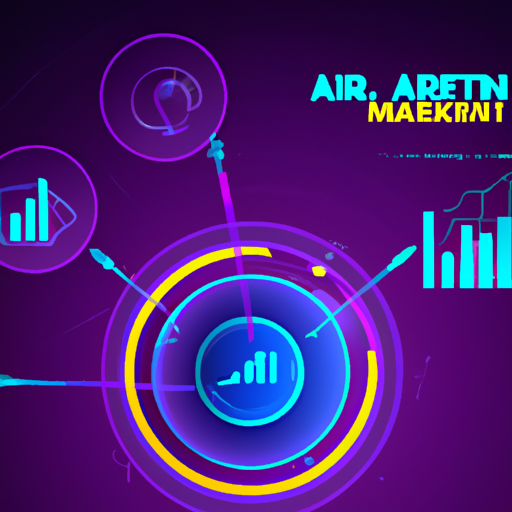In today's rapidly evolving digital landscape, the role of Artificial Intelligence in Marketing has become increasingly crucial. Marketers are constantly looking for innovative ways to optimize their marketing efforts and stay ahead in the competitive digital marketing landscape. From AI-powered tools and analytics to immersive brand experiences using AR, the future of marketing is being shaped by advancements in technology. In this article, we will explore the top digital marketing trends to watch in 2024, including AI, AR, and chatbots, and how they are revolutionizing digital marketing strategies. Join us as we delve into the role of AI in influencer marketing, conversational marketing, and creating immersive brand experiences, and discover the latest trends and strategies for marketers to stay ahead in the ever-changing world of digital marketing.
1. The Future of Marketing: How AI is Revolutionizing Digital Marketing Strategies
As we look towards the future of marketing, it is clear that Artificial Intelligence (AI) is revolutionizing digital marketing strategies. AI is shaping the marketing landscape in various ways, from optimizing marketing campaigns to enhancing customer experiences. With the rise of AI tools like ChatGPT and analytics platforms, marketers are able to better understand consumer behavior and tailor their strategies accordingly.
One of the key areas where AI is making a significant impact is in the realm of search engine optimization (SEO). AI-powered tools are helping marketers identify the right keywords to target and optimize their content for better search results. Additionally, platforms like TikTok are using AI to personalize user experiences and drive engagement.
Influencer marketing is also being transformed by AI, with tools that help identify the right influencers for a brand and track the success of campaigns. Conversational and immersive marketing experiences are becoming more prevalent, with the use of chatbots and augmented reality (AR) to engage with audiences in new and innovative ways.
The future of marketing will also see a continued focus on data privacy and protection, as regulations evolve in response to the growing use of AI and machine learning. Marketers will need to stay ahead of the latest trends and continue to explore new platforms and technologies to create immersive brand experiences and drive growth in 2024 and beyond.
In conclusion, AI is reshaping the world of digital marketing and providing marketers with new tools and strategies to stay ahead of the competition. By incorporating AI into their marketing efforts, businesses can create more personalized and engaging experiences for their audiences, leading to higher conversion rates and customer loyalty. It is essential for marketers to keep up to date with the latest digital marketing trends and continue to innovate in order to succeed in the ever-evolving digital space.
2. Top Digital Marketing Trends to Watch in 2024: AI, AR, and Chatbots
As we look towards the future of digital marketing in 2024, there are several key trends that marketers should keep an eye on. Artificial Intelligence (AI), Augmented Reality (AR), and Chatbots are expected to play a significant role in shaping the marketing landscape in the coming years.
AI-powered tools like ChatGPT are revolutionizing the way marketers optimize their digital marketing strategies. These tools can analyze data, generate personalized content, and even engage in conversational marketing with customers. By leveraging AI tools, marketers can stay ahead of the competition and create immersive brand experiences for their audience.
AR is another trend to watch in 2024, as it offers a unique way for brands to engage with their audience. By using AR technology, marketers can create interactive and immersive experiences that drive customer engagement and loyalty. From product recommendations to virtual try-on experiences, AR has the potential to revolutionize the way brands connect with their customers.
Chatbots are also expected to continue to evolve in 2024, offering a conversational and personalized approach to customer interactions. By using chatbots on platforms like social media and messaging apps, marketers can provide immediate assistance to customers and enhance their overall customer experience.
Overall, these top digital marketing trends – AI, AR, and Chatbots – are set to shape the future of marketing in 2024. By staying up to date with the latest trends and incorporating these technologies into their marketing efforts, marketers can optimize their strategies and drive growth in the ever-evolving digital landscape.
3. Optimizing Marketing Efforts with AI Tools and Analytics
One of the key benefits of incorporating artificial intelligence (AI) tools and analytics into marketing strategies is the ability to optimize marketing efforts. AI can help marketers analyze vast amounts of data to identify trends, patterns, and insights that can inform more effective marketing campaigns. By leveraging AI-powered tools like chatbots, marketers can engage with their audience in a conversational and immersive way, leading to higher conversion rates and improved customer experiences.
AI analytics can also help marketers optimize their digital marketing strategies by providing valuable insights into keyword trends, SEO best practices, and the performance of marketing campaigns across various platforms like TikTok. With AI tools, marketers can stay ahead of the latest digital marketing trends and make data-driven decisions to enhance their marketing efforts.
Furthermore, AI-powered analytics can help marketers create personalized and targeted marketing campaigns that resonate with their target audience. By analyzing customer data and behavior, AI tools can provide recommendations for product offerings, content creation, and influencer partnerships to drive customer loyalty and engagement.
In the rapidly evolving digital marketing landscape, AI and machine learning technologies are shaping the future of marketing. Marketers who embrace AI tools and analytics can explore new opportunities for growth in 2024 and beyond, while ensuring compliance with privacy regulations and data protection laws. By staying up to date with the latest digital marketing trends and leveraging AI technologies, marketers can create immersive brand experiences and drive business success in the digital space.
4. The Role of AI in Influencer Marketing and Conversational Marketing
One of the key areas where AI is making a significant impact in marketing is in influencer marketing and conversational marketing. Influencer marketing has become a popular strategy for brands to reach their target audience through social media platforms like Instagram, TikTok, and YouTube. AI tools can help marketers optimize their influencer campaigns by identifying the right influencers to collaborate with based on audience demographics, engagement rates, and brand alignment. AI analytics can also track the performance of influencer campaigns in real-time, providing valuable insights for future marketing efforts.
Conversational marketing, on the other hand, involves the use of chatbots and AI-powered tools like ChatGPT to engage with customers in real-time through messaging platforms. These tools can provide personalized recommendations, answer customer queries, and guide users through the purchasing process. Conversational marketing helps create immersive brand experiences and enhances the customer experience by providing instant support and assistance.
Overall, AI is reshaping the marketing landscape by enabling marketers to optimize their strategies, personalize their messaging, and engage with their audience more effectively. As AI continues to evolve, it will play a crucial role in shaping the future of marketing by driving growth, enhancing customer loyalty, and creating innovative marketing campaigns. Marketers who leverage AI tools and analytics will stay ahead of the latest digital marketing trends and ensure their businesses thrive in the competitive digital space.
5. Creating Immersive Brand Experiences: AI and AR in Digital Marketing
Artificial Intelligence (AI) and Augmented Reality (AR) are revolutionizing the way digital marketers create immersive brand experiences for their audience. By leveraging AI tools and AR technology, marketers can optimize their digital marketing strategies to engage with their audience in a more interactive and personalized way.
One of the key trends in digital marketing is the use of AI-powered chatbots to create conversational marketing experiences. Chatbots can provide personalized recommendations, answer customer queries, and guide users through the sales funnel, ultimately improving conversion rates and enhancing the customer experience.
In addition, AR technology allows marketers to create immersive brand experiences by overlaying digital content onto the physical world. For example, AR filters on platforms like TikTok can enhance user-generated content and encourage user engagement with brands. Marketers can also use AR to provide product recommendations, offer virtual try-on experiences, and create interactive storytelling campaigns.
By staying ahead of the latest digital marketing trends and incorporating AI and AR into their marketing efforts, businesses can shape the future of marketing and stay competitive in the evolving digital landscape. With the right tools and strategies, marketers can create immersive brand experiences that drive customer loyalty, increase engagement, and ultimately drive growth in 2024 and beyond.
6. Staying Ahead in the Digital Marketing Landscape: Latest Trends and Strategies for Marketers
In today's fast-paced digital marketing landscape, staying ahead of the curve is crucial for marketers to effectively reach and engage their target audience. With the rapid advancements in artificial intelligence (AI) technology, marketers have access to powerful tools and strategies to optimize their digital marketing efforts.
One of the latest trends in digital marketing is the use of AI-powered tools like ChatGPT and analytics to optimize marketing campaigns and improve customer experiences. Marketers can leverage AI to analyze data, identify trends, and make informed decisions to drive growth in 2024 and beyond.
Another emerging trend is the use of immersive technologies like augmented reality (AR) to create interactive and engaging brand experiences. Platforms like TikTok have also become key marketing channels for reaching younger audiences with short-form video content.
Marketers need to stay up-to-date with the latest digital marketing trends, such as voice search, live streaming, and user-generated content, to effectively engage with their audience and stay ahead in the competitive digital space. Additionally, staying informed about privacy regulations and data protection is essential to ensure compliance and build customer trust.
By incorporating AI, AR, and other innovative technologies into their marketing strategies, marketers can create immersive brand experiences, drive customer loyalty, and shape the future of digital marketing. It is important for marketing teams to continuously explore new platforms and tools like chatbots and influencer marketing to stay ahead of the curve and drive success in the ever-evolving world of digital marketing.

